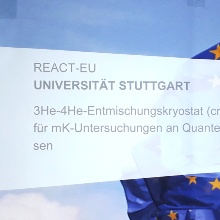The electrodynamic properties of solids often exhibit particularly interesting features when the photon energy of the probing electrodynamic radiation matches the thermal energy corresponding to the temperature of the probed material. One such correspondence is cryogenic temperature of 1 K and (microwave) photon frequency of 21 GHz. For this reason, the microwave spectroscopy research at PI1 has been extended to temperatures well below 1 K with novel instrumental strategies, going beyond the well-established cryogenics for optical, THz and microwave spectoscopy based on liquid 4He. Instead, a "wet" 3He-4He dilution refrigerator has been used in combination with various newly developed planar microwave probes to study unconventional low-energy properties of interacting metals, superconductors, and insulators.
In recent years, an additional research direction emerged: some of the materials studied at PI1 from a fundamental research perspective, in particular granular and strongly disordered superconductors, are of great interest in quantum technologies such als superconducting quantum computers and photon detectors. Therefore, we aim at making our research on these materials more directly relatable for research colleagues from the fields of these applications. Towards this aim, we want to modify our experiments to more closely match the actual application case. For the case of superconducting quantum computing, this means operating superconducting circuits at the single-photon level. Such experiments at mK temperatures nowadays are usually performed in so-called "dry" fridges which are optimized to simultaneously operate several microwave circuits and that include numerous microwave coaxial cables to connect these cryogenic devices to the microwave electronics at room temperature. Therefore, PI1 now prepares for installation of a new "dry" 3He-4He dilution refrigerator to allow further microwave spectroscopy materials studies that directly connect to applications in quantum computing.
Funding for this new 3He-4He dilution refrigerator was kindly provided by the European Union via EFRE (Europäischer Fonds für regionale Entwicklung als Teil der Reaktion der Union auf die COVID-19-Pandemie) and the state of Baden-Württemberg.



